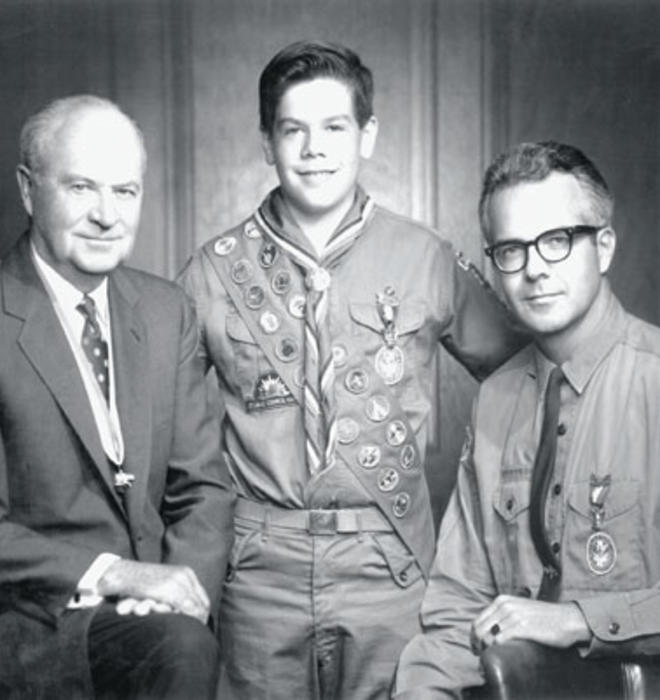
Oct. 12, 1922 – March 19, 2012
In the early 1960s, Sandy McDonnell was a rising aerospace executive at McDonnell Douglas, the company built and run by his uncle, James S. McDonnell ’21. Long hours at the office helped the younger McDonnell’s career but bothered his son, Randy (later ’74), who got into the habit of addressing only his mother at the dinner table, as if his father weren’t there.
To spend more time with his son, McDonnell volunteered to be a Boy Scout leader. When Randy began working to earn the rank of Eagle Scout, Sandy did, too. “He would wait until I would get a particular merit badge before he would get his,” Randy McDonnell recalls. The two became Eagle Scouts on the same day: 16-year-old Randy on stage, in front of family and friends, and 43-year-old Sandy backstage, his son pinning on the badge.
McDonnell later would cite his reconnection with Scouting as a pivotal moment in his life. As CEO of McDonnell Douglas in the early 1980s, he drew on values that the Boy Scouts espoused to institute a companywide ethics program. After retiring in 1988, he became a leading advocate of “character education,” and worked to foster respect and responsibility in American schools.
Charles Haynes, a First Amendment scholar and founding board member of McDonnell’s Washington, D.C.-based Character Education Partnership, says that the push to teach values in public schools encountered resistance during the culture wars of the early ’90s. On the left, many were wary that character education would usher morality and religion into the classroom; on the right, people feared that schools were co-opting the role of parents and faith communities.
McDonnell tried to find common ground. He consulted experts, listened closely to school superintendents, principals, and teachers, and read studies in education-policy journals, treating his nonprofit work as a second career.
His greatest success came in his hometown of St. Louis: CHARACTERplus, the group that he founded in 1988, has grown to support staff-development programs at more than 600 schools in Missouri and Illinois. According to its director, Liz Gibbons, the benefits of character education go beyond personal growth: Studies have shown measurable improvement in math and reading test scores at participating schools.
McDonnell, who died last March after a 16-month battle with pancreatic cancer, often quoted America’s Founding Fathers from memory, and was particularly fond of Benjamin Franklin’s remark, “Only a virtuous people are capable of freedom.” For Haynes, that summarized the motivation behind McDonnell’s work.
“It wasn’t just a feel-good thing for Sandy,” he says. “It was deeper than that.”
Brett Tomlinson is PAW’s digital editor.
CLICK HERE to watch a video of Sandy McDonnell ’44






No responses yet